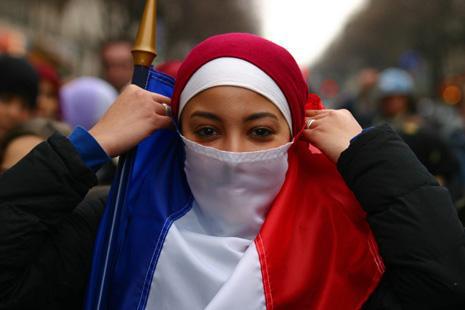The Jerusalem Post offers its take on moves across Europe to ban the wearing of the veil:
Those who support such legislation realize that an easygoing multiculturalism works only when there are basic shared values and a willingness to integrate. But European multiculturalism has deteriorated into rudderless moral relativism and a pusillanimous reluctance to criticize radical Islamic customs for fear of being branded an Islamophobe.
Sadly, some Jewish leaders, such as Rabbi Pinchas Goldschmidt, chief rabbi of Moscow and leader of the Conference of European Rabbis, have helped foster such unfounded fears. “Sixty-five years after the liberation of Auschwitz,” wrote Goldschmidt in the New York Times in February, in an op-ed opposing the idea of bans on the burka, “Europeans can permit themselves to be squeamish about how things start and how things, if left unabated, can end.” As a rabbi, he added, “I am made uncomfortable when any religious expression is restricted, not only my own.”
Goldschmidt has got it wrong. Europeans have a right to feel uncomfortable. But not, as Goldschmidt argues, because Europeans are being too hard on Muslims. Rather, because they are being too soft.

 SEATTLE — An Auburn man found guilty of
SEATTLE — An Auburn man found guilty of  Qatar-based Islamic scholar Sheikh Yousuf al-Qaradawi yesterday slammed the practice of denying women access to mosques by Muslims of South Africa as well as of the Indian subcontinent and said that he was surprised that women were not allowed to attend any of his lectures in Johannesburg during his recent visit there.
Qatar-based Islamic scholar Sheikh Yousuf al-Qaradawi yesterday slammed the practice of denying women access to mosques by Muslims of South Africa as well as of the Indian subcontinent and said that he was surprised that women were not allowed to attend any of his lectures in Johannesburg during his recent visit there. Two-thirds of French people want a law limiting the use of face-covering Islamic veils such as the niqab and the burqa, with only a minority backing the government’s plan for a complete ban, a poll showed Saturday.
Two-thirds of French people want a law limiting the use of face-covering Islamic veils such as the niqab and the burqa, with only a minority backing the government’s plan for a complete ban, a poll showed Saturday.